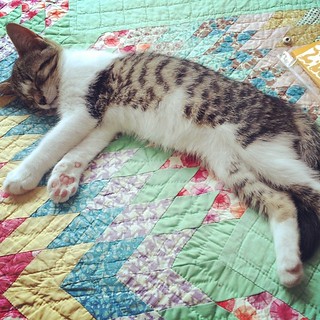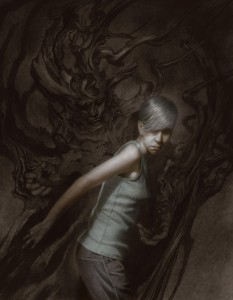Peter Watts has been thinking and writing about surveillance in society , about how governments have cameras everywhere and facial recognition software that works (if your haircut’s symmetrical), about how all of our e-mails and blog posts end up archived in big NSA spy computers. About how corporate entities like the iStore can track not only our movements (via our phones) but the number of times we watched our legally downloaded copies of Iron Man 3. (Answer – 3.25).
He’s talking about how our televisions may one day have the power to say, “Hey, there are four people in this room and only three of them are licensed to watch Game of Thrones, so I’m powering down until you kick that freeloading bastard outta here!”
He’s pointing out that all the information lovingly gathered by corporations can end up in ill-intentioned government hands any old time, or even just as a matter of routine if the companies in question are feeling generous.
In the midst of his latest article on this subject, he says:
“I was ranting to a friend the other day as she booted up her smart TV, ran down the usual list of grievances and suspicions and countermeasures. She listened patiently (as you know, I do tend to go on sometimes), and finally drawled “You know, your arguments all make sense, but I just don’t really care.”
So, first: I wasn’t listening patiently, Squid. That implies I was humoring you. I was interested in what you were saying, even if I was also rather amazed at your ability to finish sentences in the presence of CinZo. Because every thought either Kelly or I begins at home right now seems to end with “… blah blah blah the nuclear physics, and its impact on society… OMG, kids, you are cute! So cute! Photo op!”
Go ahead: start a big thought and then look at this:
Yeah, I said I didn’t care. It was a bit glib and yet in many ways true. More precisely, I don’t care enough. Not enough to spend cash on having a computer at home that’s not connected to the Internet. (Anything I truly didn’t want the world to know would never find its way onto a hard drive, or even a piece of paper.) Not enough to worry about whether Apple has a detailed map of my movements when I’m rabidly posting geo-tagged photos everywhere I go on Instagram. Frankly, I think of that stuff as my alibi cache:
“Actually, Detective, I’m pretty sure I can produce a picture of me and Richard Kimble in the Distillery District at the time when the crime took place.”
I certainly don’t care enough to torrent all my media instead of buying it from corporate providers, even if they do count my watch history–or to to eschew Netflix. Hell–if they could actually use my viewing habits to accurately predict what I’d love to watch, my daily half-hour of TV would be more effectively used.
(It used to be more TV. Again, kittens are so time consuming!)
It’s true that I don’t actually *need* Netflix to recommend stuff. My friends do that–check out Gemma Files and her drive-by film and TV reviews–but Peter’s not wrong. We should take him seriously. It’s reasonable to want our TVs to be passive machines that deliver entertainment without reporting on our viewing habits, private conversations, sexual antics and political leanings. The fact that we’re not only living in the age of Big Brother but paying companies hundreds of dollars to give us the shiny surveillance devices they can potentially use to watch us is insulting and creepy.
And it’s a little sad, maybe, that I’m comfortable with letting someone mine my data if I can watch Youtube videos in a 36-inch format. There’s a vein of laziness and apathy there, and I know it’s not necessarily admirable.
The thing is, the hypothetical privacy ship has long since sailed, hasn’t it? Peter was halfway through breaking down the TV thing for me before it occurred to him to glance at my flatscreen and jokingly ask if it might be listening. Our phones were on. Heck, the window was open.
If you want to plan a (virtuously-motivated, civilly-disobedient non-violent) crime these days, and you want to be 100% sure Ominous They couldn’t get wind of it, could you put a working Cone of Silence together? Is that possible? Even if you pulled it off, and didn’t leave any kind of evidence trail, Peter himself points out that Ominous They don’t really care about the law. Innocent or guilty, alibi trail or not, evidence could be manufactured if they liked you for the deed.
Saying “I don’t care” was dismissive. It is, to some extent, untrue. The corporate info-gathering does, at times, annoy the crap out of me. When some peppy twenty-something from the drug store calls and starts to tell me when I last renewed my prescriptions, what follows does not result in their having a good day at work. (Those people mostly don’t call anymore.) Until we moved, I made a regular practice of doing most of my shopping on a cash basis, with an eye to limiting the bank’s total understanding of my consumer habits. By chance, that paid off for me once, when someone tried to phish my bank card–there was literally only one place where I’d used debit in the past month. I tell varying wild lies to the Internet services I sign up for about my age, genders and location. If there’s no reason for you to know where I live, your database probably has my dead grandparents’ postal code.
Peter talks about not liking the feeling of being prey.
My friend, we’ve never been anything else. I’ve never doubted it. I was in the closet until about 1989, and there was a definite feeling, at that time, that amounted to keep your head down or lose it. Back in my student activist days, it was generally assumed–I admit this was probably just twenty-something drama queenery–that CSIS kept files on us all. My Sixties-vintage parents had a touch of the same bug; they swore that because they had friends in the SDS, their phone in Utah was tapped.
I’m not saying that if you have nothing to hide, you have nothing to fear. That is, I know, bullshit. I’m saying that if you have something to fear, you’re probably already screwed. Which is maybe fatalistic, but governments have historically shown it to be the case time and again. And they didn’t need Facebook to help them. Facebook just makes it easier and inexpensive.
Which is why the essence of Peter’s argument is this: Ominous They can watch us, but we can make the system expensive, difficult, and buggy. We can sabotage!
(This presumably means obliging Them to use more of our tax dollars on keeping track of us. Because a higher price point won’t curb the attempt, will it.)
I’m not necessarily against making the surveillance society less effective. But here’s my thought: what you’re arguing for, really, is better anti-predator adaptations. Increasing our chances of dodging the hyena pack. To borrow the cats and mice metaphor, you’re telling us to be better mice. Or maybe to evolve out of rodentness altogether and become antelope, so there’s a big herd of protein ready to circle ’round when something comes at you, claws out.
So here’s one conundrum: being a better antelope, having a bigger herd, might mean embracing the Book of Face. That’s the virtual watering hole, ain’t it?
And that I’m down with. This may be about accepting your preyness, Peter, and deciding what kind of delicious edible thing-without-claws you want to be. Are you in truth a mouse, living in the house of Ominous They, snurching crumbs of delicious data from their cupboards, and pondering whether you can ease the cheese out of the basement mousetraps without falling afoul of Newton, the Maine Coone Death Machine? The tools of the successful prey species are hiding, camouflage, breeding in inextinguishable numbers, being too toxic to eat, and running like hell. Can we translate some or all of those to our gadget-abundant ecosystem?
What does a person who feels passionately about this do with the faintly-indifferent mass of Netflix-loving folk who are just hoping to crouch in the grass, unseen and uneaten? Is there a way to get us on board with being antelope?
Maybe. We live in a time where you can get people to do nearly anything if it’s easy, sexy, cheap and fun. Hiding your data would have to be as simple and more emotionally rewarding than having points cards and a map of everyplace on the planet where you’ve ever posted a photo. It would have to outcompete iTunes and Google in terms of joy delivery. Easy, right? Basically, all I’m asking for is a civil disobedience app.
Having said that, I will check out the e-mail shredder and the other stuff Peter posted. If it’s easy, the work of a few minutes to chop up my outgoing messages, I’ll do it. I figure I owe the herd that much.





